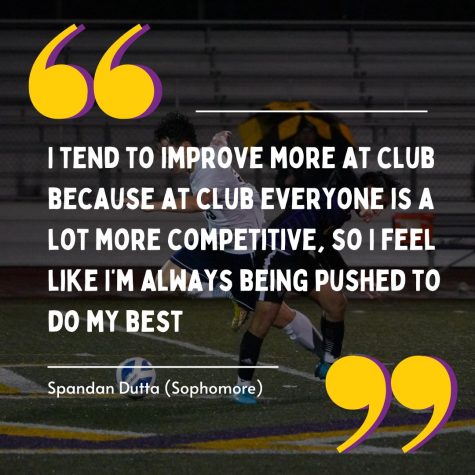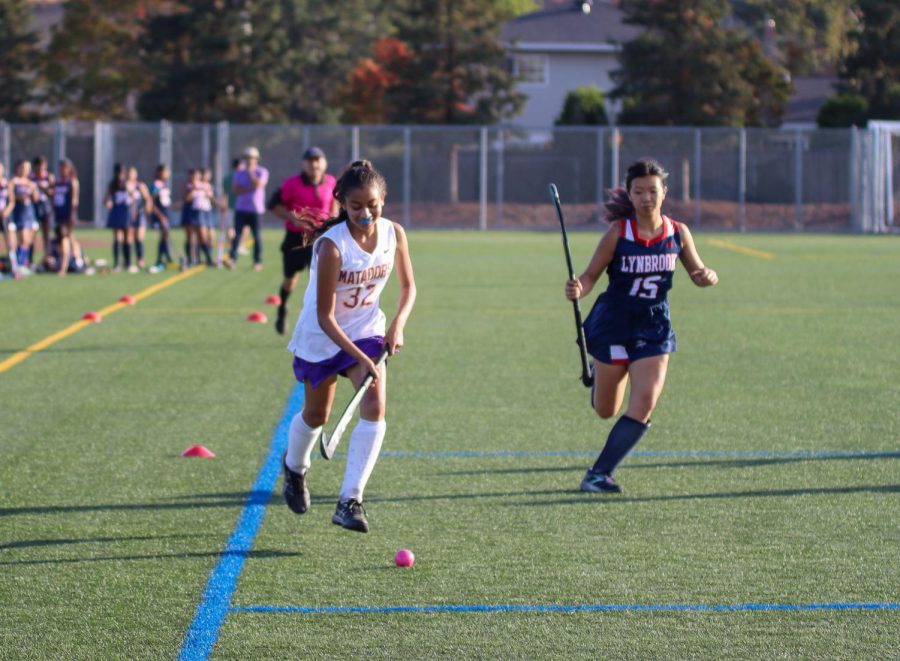Differences between club and school athletes
Exploring what athletes like and dislike about on a club or school sports teams
Freshman Monisha Preetham passes the ball to her teammate across the field.
February 13, 2023
Basketball, football and soccer were some of the sports that sophomore and volleyball libero Praneel Shah cherished, but as he entered middle school, he chose to pursue volleyball as his main sport. Shah not only practices with the Varsity Volleyball during spring season, but also plays for a professional volleyball club during the fall season, MVVC, which he says covers skills that are more advanced.
Freshman and field hockey midfielder Monisha Preetham, who also plays both club and school teams, highlighted that her school team spends a lot of time learning the basics since many of the players are beginners. Furthermore, Preetham says that because “there really aren’t a lot of field hockey players in the Bay Area,” those who play on her club team have truly dedicated their effort in playing this sport, thus drawing a difference in mindsets between club and school teams.
“In club, since there are more people who are dedicated to hockey, everyone shows up to practice and games, which really helps with team dynamics,” Preetham said. “In school, especially since field hockey is a no-cut sport, some people aren’t as dedicated compared to clubs.”
Sophomore and soccer center back Spandan Dutta attributes this difference in mindsets to the cost of playing on a club team.
“The club team is a lot more dedicated because everyone has to pay money to get there and also everyone is around the same skill level which is pretty high,” Dutta said. “While in school soccer, there are some people who are really advanced and some people who are just not there yet.”
In addition to the varying skill levels, Preetham also states that the new athletes needing to learn the basics of the sport leads to a lack of time for players to focus on teamwork and communication, resulting in school teams lacking chemistry compared to club teams.
Shah, however, expresses the view that his club team is more relaxed, and the school team is more “disciplined”.
“Club teams seem to be way more chill: we know each other pretty well from tournaments and practices, and we have a lot of good chemistry,” Shah said. “On the other hand, the school season is a lot more disciplined, we still have some fun, but it’s a lot more serious to get better. Everyone is focused at getting reps in, and it’s a different environment.”
Likewise, Preetham shared how she similarly noticed how the dynamic between players in her club team is far stronger than the chemistry between school field hockey players because players continue to join and leave every year making it difficult to maintain a strong bond within the school team from year to year.

Furthermore, Preethan notes that as most players in clubs have advanced skill sets and the same
motivation to improve. She feels challenged against the “more skilled players” in her club. Dutta shares similar sentiments of improving more on his club team, adding how the club brings out the best in him.
“I tend to improve more at club because at club everyone is a lot more competitive, so I feel like I’m always being pushed to do my best,” Dutta said.
However, while club sports provide players with an opportunity to improve their skills, this opportunity does come at a cost, unlike the school sports teams where players can join with just a 65 dollar recommended donation. However, Dutta does not regret paying to join his club, claiming that the pros of joining club outweigh the cons.
“It’s [around] 1,000 dollars a season and I think the money is worth it for the competitive environment,” Dutta said. “But I definitely think that playing school for free is a really good option for people who might not be willing to shell out the money.”
While Dutta enjoys playing for his club just as much as he enjoys playing for school, Preetham prefers playing for a club as she can travel and connect more with her teammates.
“The club I play for costs a bit more than the other clubs around here [because] we travel a few times to L.A. and Chula Vista for regional tournaments, which [exposes] you to higher level teams, [an opportunity that] really helps [players improve],” Preetham said. “Overall, I think that club is good for people who are looking to play more competitively and possibly after high school.”


















